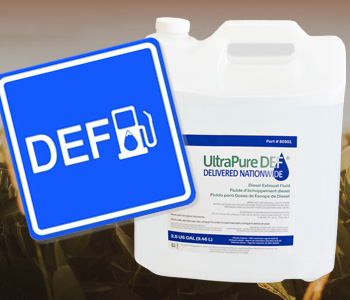Proper Handling of Diesel Exhaust Fluid
Apr 01, 2025

Article Provided by Brian Irwin, Lubricants Manager
Diesel Exhaust Fluid (DEF) is used to reduce NOx emissions and particulate matter through Selective Catalytic Reduction (SCR) technology. SCR systems convert NOx into water and nitrogen vapor, significantly reducing harmful emissions. DEF became widely used in the U.S. in 2010 to comply with EPA standards that took effect that year.
Diesel Exhaust Fluid is composed of 32.5% urea and 67.5% water. With proper storage and handling, DEF has a shelf life of approximately 18 months.
Do’s and Don’ts for Proper DEF Handling
✅ DO store in a cool, dry, shaded area.
✅ DO store in approved containers such as HDPE, polypropylene, and stainless steel.
✅ DO use DEF if it has been frozen and thawed—it is perfectly safe!
✅ DO keep the nozzle and fill points clean to prevent contamination.
❌ DON’T expose DEF to direct sunlight or heat for long periods.
❌ DON’T use a funnel or bucket to fill DEF tanks. Even if they look clean, it's nearly impossible to remove all contaminants.
❌ DON’T add antifreeze, chemicals, or additives to DEF.
❌ DON’T use DEF if it appears cloudy or discolored—it is likely contaminated.
Farmers Cooperative carries a full line of DEF products, including 2.5-gallon jugs, 55-gallon drums, and bulk options. We have over 30 locations that stock DEF or can arrange delivery. Bulk DEF can also be picked up at our Emerald and Cortland locations. We offer on-call or scheduled bulk delivery to farms and businesses.
Additionally, we carry a complete selection of pumps, hoses, nozzles, reels, and storage totes.
Give us a call today to schedule a delivery or ask any questions: 402-798-2170